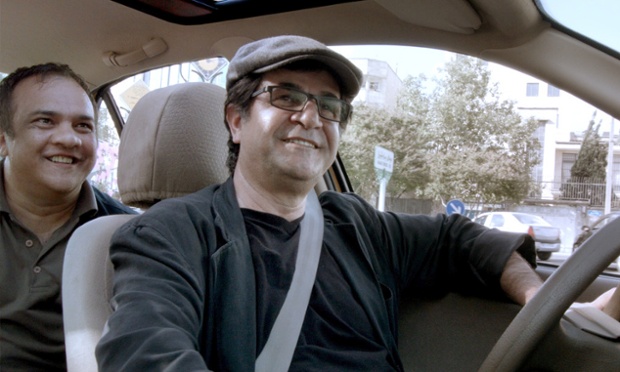Taxi (2015): Written and
directed by Jafar Panahi. Starring: Jafar Panahi, Hana
Saeidi. Running time: 82 minutes.
Rating: 3.5/4
There are obviously a lot of
passionately divided opinions about the nature of the recent nuclear accord
reached between the US and Iran. It will
be a long, long time before we can ultimately assess how positive or negative
the effects of this deal will be, but I think it is already safe to say that
they will be momentous either way, and like any sane person, I am hoping for
the best outcome possible. This is
mostly for the obvious big-picture, geopolitical reasons, but I also have a
smaller, personal motive for pulling for the agreement thing to succeed- maybe,
just maybe, increased ties to the global order and greater economic prosperity
will nudge the Iranian government towards loosening its restrictive domestic
policies, and the director Jafar Panahi and other artists like him will finally
be able to walk free, to create and tell the stories they currently have to
keep hidden in the recesses of their minds.
Most Americans who know Panahi will
likely know him for the Oscar-nominated This
Is Not A Film, the title itself a biting play on the fact that Panahi was banned
from making any films by the Iranian government following the failure of a
series of post-election protests in 2009 (since then, he has been given
tentative permission to “unofficially” make movies). After that film received no small amount of
international renown, he came out with Closed
Curtains, about a man cooped up in a house covered in curtains (and from
there the real-life parallels only get more obvious). At the time, one critic wondered whether or
not his prolonged captivity and the severe restrictions it places on his
artistic freedom might eventually lead to him hitting a “creative wall.”
Now, though, Panahi has once again
found his own unique way around the absurd circumstances he still finds himself
subject to, proving, if nothing else, that true human creativity can never be
contained, and will always out itself one way or another. Indeed, why else would autocrats and
dictators go to such extreme lengths to dominate, kill, or exile the artists
before all others? They know- even if
many in the West have forgotten this- that true power to move and change the
hearts and minds of an entire people comes not from scientific discoveries or
rising stock indexes, but from the arts, and all the myriad and subtle tools
they have access to that can shape our thoughts, words, and deeds.
Taxi
is one of those films I would describe as a “meditation on existence,” if such
a phrase makes sense. With no apparent narrative
thread in place, Panahi takes us into a typical Iranian taxi car, fixes a few
cameras to the dashboard, and embarks on a day-long odyssey through the streets
of Teheran. Most of the film consists of
short segments centered around one or a handful of passengers that get in, ask
to be taken somewhere, and chat a bit with Panahi about pretty much anything
under the sun before getting out. There
are two people that make extended appearances- in the first half, we get many
earfuls on the benefits of selling pirated films from a street hustler, who
instantly recognizes Panahi and knows he’s not a real taxi driver. The second half is dominated by the presence
of Panahi’s joyfully witty niece, who opens up by berating him for daring to pick
her up in a mere taxi cab- it seems she’s been bragging to her classmates that
her uncle is a famous filmmaker, and if they saw him now they would think she
was lying. As she puts it- “If you don’t
want to think about your own career, then think about mine.”
I wrote “people” and not
“characters” above because it’s not clear how much of the scenes and people presented
are real things Panahi caught on film by chance, and how many of them were
staged, or at least knew from the start they were in a film. The hustler and a few other scenes with
people that recognize Panahi, as well as the presence of his niece and her
constant, almost fourth-wall-breaking chatter about filmmaking techniques and Iranian
film laws, could certainly give off the impression that they had been directed at
least somewhat. Then again, a few other
scenes come across as powerfully, viscerally real. If they were real, it was an extraordinary
stroke of luck that Panahi happened to pick the day for filming that he did. If not, what a remarkable job he did in finding
the perfect actors to play their respective roles. Ultimately, whether or not all, some, or none
of the scenes in the movie are real is a question I think I would rather not
have answered. At least, not yet.
If there is a key importance to this
movie, it would be in how effectively it works in reminding viewers that,
beneath all the rhetorical bluster about Satan and genocide exuded by the
Iranian government, Iran remains a place like all other places- full of
ordinary people, good and bad and in between, just trying to get by and create
decent lives for themselves and their families.
This is especially the case with the women we encounter, who come in all
shades of dress, age, and attitude, and will certainly relieve more than a few
viewers of their own half-formed stereotypes about Iranian gender
politics. Each character- or person- is
real in their own small way, and that is something beautiful. It is such ordinary people that form the core
of all nations and societies in this crazy world of ours. And like all great movies, Taxi does its own small part to remind
us of that.
-Noah
Franc

No comments:
Post a Comment